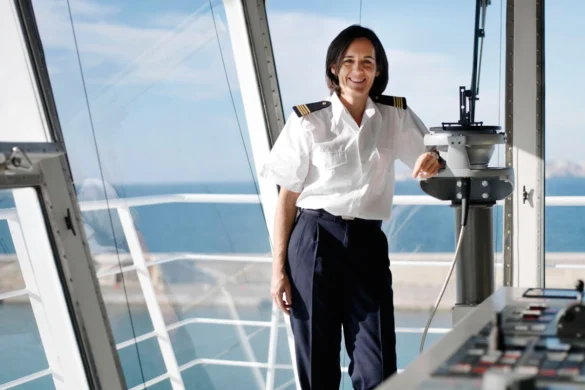The Merchant Navy, often overshadowed by its military counterpart, remains one of the most male-dominated industries in India and worldwide. However, a growing number of women are now showing interest in this field, driven by the promise of global exposure, high income, and the adventure of sea life.
While challenges such as workplace safety, gender pay gaps, and limited female representation persist, industry bodies, governments, and educational institutions are taking steps to make the maritime sector more inclusive and accessible for women in the Merchant Navy.
Overview of the Merchant Navy
The Merchant Navy refers to the commercial shipping industry responsible for transporting cargo and passengers across international waters. It includes oil tankers, container ships, cruise liners, and other non-military vessels.
Career Opportunities in the Merchant Navy
Women can pursue various roles at sea and onshore. Below is a breakdown of key positions available:
| Career Path | Description | Progression Path |
|---|---|---|
| Deck Officer | Manages navigation, cargo operations, and safety on board | Deck Cadet → 3rd Officer → 2nd Officer → Captain |
| Marine Engineer | Oversees engine room operations, technical systems, and ship maintenance | Trainee → 4th Engineer → 2nd → Chief Engineer |
| Electro-Technical Officer | Responsible for electrical and electronic systems onboard | ETO → Senior ETO → Chief Electrical Engineer |
| Catering & Hospitality | Manages crew and passenger welfare, food, and accommodation on ships | Assistant → Chief Steward or Hotel Manager |
| Shore-based Roles | Involves logistics, port operations, maritime law, and shipping management | Entry-level → Managerial/Executive Positions |
Educational Pathways and Eligibility
To enter the Merchant Navy, candidates must meet certain academic and physical requirements. The details are as follows:
| Criteria | Requirement |
|---|---|
| Academic Qualification | 10+2 with Physics, Chemistry, Mathematics (minimum 60%) |
| Age Limit | Generally up to 25 years for pre-sea courses |
| Physical Fitness | Good health, no color blindness, vision 6/6 (unaided) |
| Entrance Exams | IMU-CET, Sponsorship exams from private maritime companies |
| Approved Courses | B.Sc. Nautical Science, B.Tech Marine Engineering, Diploma in Nautical Science |
| Duration of Courses | Ranges from 1 year (DNS) to 4 years (B.Tech Marine Engineering) |
| Recognized Institutions | Indian Maritime University, Tolani Maritime Institute, Anglo-Eastern Maritime Academy, Great Eastern Maritime Academy |
Industry Challenges and Evolving Landscape
Despite progress, individuals in the Merchant Navy face several challenges. However, industry reforms and global efforts are gradually improving the situation:
| Challenge | Recent Developments |
|---|---|
| Underrepresentation | Global campaigns by IMO and NGOs to increase female participation |
| Gender Pay Gap | Adoption of transparent pay systems across shipping companies |
| Workplace Harassment & Safety | Implementation of onboard grievance redressal systems and women-only cabins |
| Limited Role Models and Mentors | Growth of women-led maritime networks and mentorship initiatives |
| Infrastructure Limitations on Ships | Modern ships now include gender-sensitive design and facilities |
Key Organizations Supporting Seafarers
Several organizations are working toward gender inclusion in maritime careers:
- International Maritime Organization (IMO): Promotes women’s empowerment through global awareness campaigns.
- Directorate General of Shipping (DG Shipping), India: Regulates maritime training, ensures standards, and offers scholarships.
- International Women Seafarers Foundation (IWSF): Focuses on training, mentoring, and support for Indian women seafarers.
- Maritime Training Institutes (DG Shipping-approved): Reserve seats and offer incentives for women candidates.
Inspirational Examples
The success stories of pioneering women provide encouragement and proof of potential in the maritime sector:
- Captain Radhika Menon – The first Indian woman to receive the IMO Award for Exceptional Bravery at Sea.
- Captain Anuja Joshi – Among the first women marine engineers in India to hold senior positions on merchant vessels.
Interesting Read
Should students work while studying? Exploring India’s earn-and-learn model
Future Outlook
With globalization and increasing international trade, the demand for maritime professionals continues to grow. Shipping companies are now looking beyond traditional hiring practices to diversify their workforce. Women with the right training, resilience, and passion are well-positioned to succeed in this industry.
Furthermore, government initiatives, training subsidies, and campaigns supporting women’s entry into STEM and maritime fields are expected to further bridge the gender gap.
Conclusion
A career in the Merchant Navy offers a rewarding, adventurous, and globally respected path for women. While the road may come with its share of challenges, the increasing support systems, growing awareness, and changing infrastructure are making the industry more inclusive. With the right academic qualifications, physical fitness, and mindset, young women can confidently explore the vast opportunities the maritime world offers.


